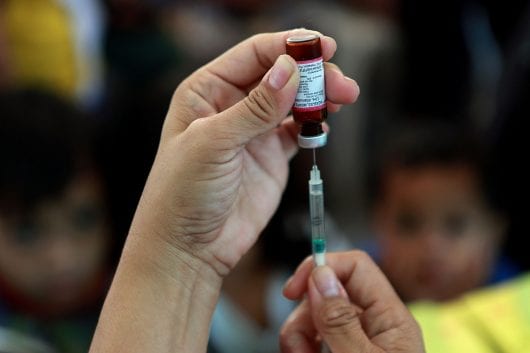
Ohio State’s vaccination requirement is the most preventive measure to keep students and the Columbus community safe. Credit: Courtesy of TNS
With recent measles outbreaks occurring in states ranging from the Pacific Northwest to New York, Kelli Newman Myers, director of public affairs and communications of Columbus Public Health, warned that though the outbreak isn’t in Ohio, that residents should still be vigilant.
“We’re not having an outbreak here, but we live in a very mobile society,” Myers said. “An outbreak could be just an airplane ride away.”
Ohio State’s vaccination requirement — which requires all students to be vaccinated to enroll in classes — is the most preventive measure to keep students and the Columbus community safe Dr. Gladys Gibbs, director of Student Health Services, said in an email.
“Student Life Student Health Services has been working diligently to oversee the University’s vaccination requirement since fall 2015,” Gibbs said.
Measles is currently on the rise again due to an increase in children not being vaccinated, Gibbs said.
Parents’ health concerns about the measles vaccination can be traced back to a fraudulent 1998 study that falsely claimed the vaccination could lead to autism in children, Steven Rissing, a professor in the Department of Evolution, Ecology, and Organismal Biology at Ohio State, said.
“There’s a trade-off here between individual freedom and the public health,” Rissing said. “If we keep vaccination levels low, then we’ll see this repeat again and again.”
Gibbs described the disease as being highly contagious and those who have not been vaccinated or did not receive the second dose of the measles vaccine are most at risk.
“We can help any individual who has not been completely immunized to do so,” Gibbs said. “Vaccination is the No. 1 preventive measure to avoid the spread of measles.”
Rissing said universities are concerned with student vaccinations before they enroll in classes due to the large size of lecture halls that create opportunities for diseases to spread easily.
Travel is also one of the main concerns surrounding the measles outbreaks, making vaccination especially important for students studying abroad. Measles outbreaks are being reintroduced into the United States from people who are traveling from other parts of the world where the disease is much more common, Rissing said.
If travelers aren’t vaccinated for one reason or another, there can be serious consequences.
“If there’s not a good defense here at home, then an epidemic can take hold and start to spread since it’s very contagious,” Rissing said.
Gibbs advised students that when choosing a study abroad experience, to understand the diseases that are endemic to that location.
“Student Health Services does provide travel visits to discuss appropriate vaccines as well as other travel health considerations,” Gibbs said.
With measles now affecting the United States, Myers said that an outbreak of any vaccine-preventable disease serves as a reminder of the importance of being vaccinated to prevent these kinds of illnesses.
“It’s just important that everyone is vaccinated to protect themselves, their loved ones and the community at large,” Myers said.


